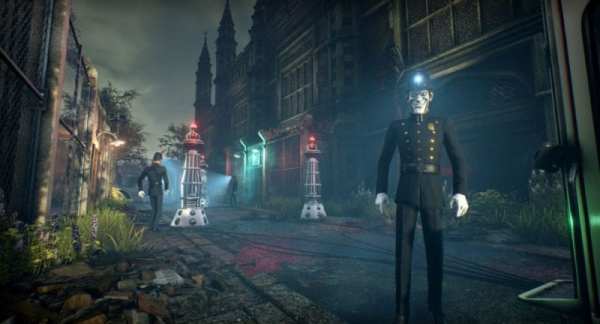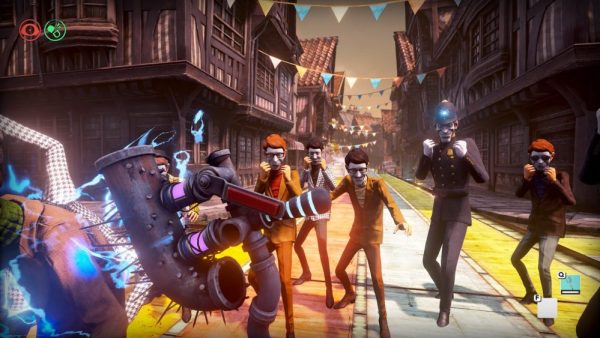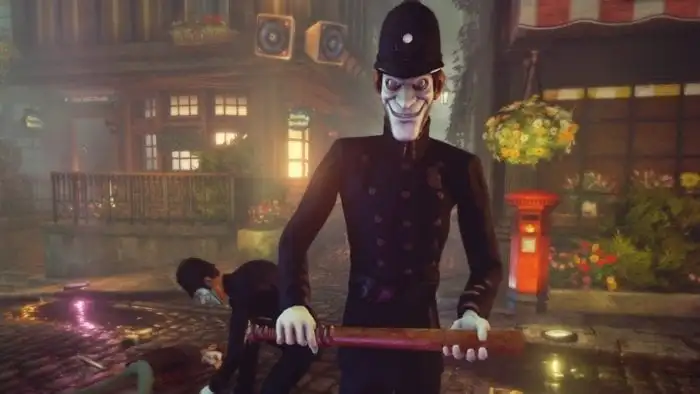I’m a huge fan of dystopian literature, so when Compulsion Games first teased We Happy Few I couldn’t wait to get my hands on it. We Happy Few’s alternate version of history, a police state in which the inebriated inhabitants of a 60s British town are on the verge of societal collapse, was terrifying and spoke to everything I love about the genre. The inspirations were so clearly drawn from some of my favorite novels, like Aldous Huxley’s Brave New World, and George Orwell’s 1984. So I looked forward to appreciating how the developer would weave sociological questions into what also promised to deliver a satire of contemporary society. Furthermore, I was keen to see how that would translate to a video game experience. What we first got, of course, was a survival experience in Early Access, which on later evolved into the story-driven final version.
I was keen to understand more about the development process for We Happy Few and about some of the decisions that led to various mechanics being implemented in the game. Sam Abbott, chief operating officer from Compulsion Games was kind enough to answer some of my questions below.
Alex Gibson of Twinfinite: The final version of the game ended up weaving a super narrative into the experience that I think plenty of fans were yearning for after Early Access. For that reason, I’d like to hear about the game’s development during its Early Access period and how that helped to shape the final product. Do you think it was a process that dramatically changed your overall design of the game?
Sam Abbott, COO of Compulsion Games: Yes, I think dramatic is an understatement – there is no way the game would be where it was without the Early Access process. It would have many of the same themes and similar mechanics, but the storytelling would be smaller and less ambitious and the mechanics much simpler. The general development process was about us learning more and more about what people wanted from the game, and building to what we hoped were their expectations. This could range from smaller things like making survival optional, to bigger things like making larger handcrafted gameplay areas (like the Joy Factory or Military Camp). I don’t think a single part of the game was left untouched by the process, and I’m very proud of how we managed to change the game in response to feedback.
Twinfinite: Let’s talk a little more about survival mechanics, because those were toned down somewhat in the final version of We Happy Few. It’s obviously a mechanic that can dramatically impact the pacing of storytelling in a game. What was behind the decision to include them in We Happy Few in the first place, and do you feel as though you were able to strike a satisfactory balance between survival and storytelling in the end?
Abbott: Well, I don’t think anyone anticipated just how dramatically survival mechanics would interrupt the flow of our storytelling. It became evident during Early Access, because we were both increasing the scope and playtime of the game. It turns out, survival mechanics aren’t too much of an issue when you only have a couple of cutscenes, but become much more of a factor when your story content increases. We think this is because players feel the tension of dying from hunger/thirst, and so aren’t super free to enjoy a cutscene and have to move on quickly afterward to find food instead of being able to explore at their leisure. While this makes thematic sense in Wellington Wells, it’s not what people wanted or enjoyed.
We experimented with a couple of options, from reducing the rates to removing them entirely. In the end, I think we’re reasonably comfortable that the final buff/debuff system keeps the thematic elements we wanted but doesn’t interfere too much with your story. If you don’t eat, no big deal, but at least you’re reminded that this society is, in fact, starving to death. And you can also just turn off the debuffs if you want to.
Twinfinite: Did Compulsion Games always intend for the story to be shared between three characters, or was that something that came about during Early Access?
Abbott: Always intended. One of the early ideas was a city and world seen from different vantage points, and the idea of people remembering conversations or the world they live in differently. That aspect didn’t change from Early Access at all.

Twinfinite: In most of the trailers and footage we’ve seen of the game, we always get a look at the dark intro where Arthur is off his Joy and witnesses his colleagues beating a pinata that turns out to be the body of the dead rat. Because of how dark and sinister the tone was from all that footage, it was a little surprising (pleasantly so) to see that there was so much humor injected into the writing, sometimes even to the point where the story can feel a little satirical. How did you strike a balance between keeping things dark and lighthearted? Was it always your intention to rely on black humor/comedy to tell the three stories in We Happy Few?
Abbott: Well, I think the game is a satire as a whole – it’s a take on what happens when you can’t face reality, and would rather just ignore it. That seems to be a common theme throughout history, but especially so today in the era of obviously-disprovable “fake news” and propaganda. But the problem with dealing with topics like that, or starvation, or murder is that it’s a bit of a drag, man! People don’t mind being challenged with negative emotions for a couple of hours, but when you have a game that’s attempting to be fun for 15-40 hours, you need something to keep you going. For We Happy Few, I think it’s Alex and Lisa’s writing that does that. Likewise, I think the setting is conveniently absurd – absurdity without humor just feels like a missed opportunity.
Twinfinite: Obviously, game development is an iterative process and there are always ideas that are left on the table, but were there any interesting mechanics, or even story beats that didn’t make the final version that the team was disappointed about?
Goodness me, I have 4.5 years of stories about stuff like that. The story beats remained fairly consistent, although the bits between the beats changed a lot, and Sally’s story was reworked a couple of times. Mechanics, early on we had the idea that every character would have a signature ability that would have affected how they played. However, we felt that was a bit too magical and stuck with the different item and drugs plans that we had.
Twinfinite: Moving over to gameplay, can you talk about the process of how combat was originally conceptualized during the early development of We Happy Few? Was it always envisioned as a game that wouldn’t feature deep combat? Would you say that the final version of the game was more or less representative of that initial vision, or did you either dial up or wind back combat mechanics in the end?
Abbott: This is an interesting question, because it’s one of those areas where no matter what you plan as a developer, people will always have different opinions. We Happy Few is not really a combat-focused game, but we can’t stop people wanting it to be.
Combat was always a pillar of the gameplay, but it was intended to be the option of last resort. The other pillars (which you were supposed to try first) were the blending in and stealth angles, because turning you into a superhuman combat beast just didn’t feel right inside the world. So we opted for relatively simple but punishing combat. That being said, I think we also didn’t do a good enough job of working with the depth of the systems we have – we have regular hitting, but also a combo system, blocking and parrying, shoving, different weapon types and immunities, stuns and knockbacks… you just don’t see them too often. We use them internally, but I haven’t seen a lot of players in the wild using them, which I think is a combination of us not always explaining it and then because you can get away with just hitting people.

Twinfinite: With respect to future support for We Happy Few, there is a planned sandbox mode as part of the Kickstarter, so could you give us a better understanding of how that will work? Playing a Wellie will obviously be a radically different experience to the characters from the main game, so what should we expect?
Basically, it’s an upgraded version of the sandbox that we had in 2015/2016, so no story content and just a world to explore that you can customize a bit. You will be able to play as a Wellie and flip some of the gameplay mechanics (eg Joy use) on its head, or just play a more regular survival experience. That being said, it’s really just a sandbox to play around in; I would not expect substantially different mechanics or too many new surprises.
Twinfinite: Beyond the new sandbox mode, could you talk about the other content on the way with the season pass?
Abbott: For story content, we do have three paid DLC on the way. The team started working on this a couple of weeks ago, and we have three stories coming: two smaller stories that are a bit more out there and weird (if that’s possible compared to We Happy Few), and one longer story that is more like the main character’s stories. I’d like to talk more about these but as they’re still in very early development, I don’t want to jump the gun yet.
Twinfinite: Is there a possibility we’ll see We Happy Few launch on Nintendo Switch? And while we’re on the subject of other platforms, does Microsoft’s acquisition of Compulsion affect future support for We Happy Few? Are we likely to see anything Xbox-exclusive moving forward?
Abbott: So for We Happy Few and Microsoft, you should not expect any changes there. We’ll still be making the DLC for all our supported platforms.
We are not currently working on a Switch version of We Happy Few. We would need to do a significant amount of work to get the game to run as it was never designed for that kind of hardware. That being said, we know that Switch players are enthusiastic about it and we will be looking into whether it’s possible and what that might take.
***
That wraps up the interview, but if you’d like to read our review of We Happy Few, you can check it out here. You can read our article about classic literature that has inspired some of our favorite video games here.





Published: Sep 11, 2018 12:06 pm